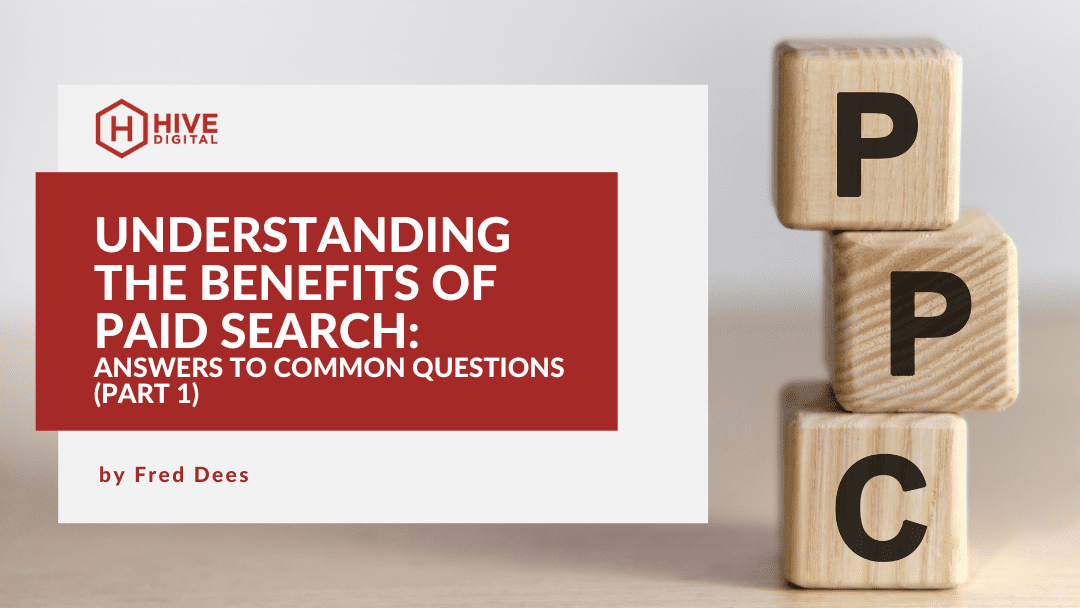Over the years, our paid advertising team has been on the receiving end of many questions about paid search and the value that pay-per-click (PPC) initiatives can bring to businesses, both large and small. Some questions are more common than others, and with all the potentially misleading information found all over the web, it’s no surprise that there are a lot of misconceptions about this form of digital advertising and the impact it can have on one’s business.
Here are a few common questions our team has received, and answers that can help you determine if your business can also experience the benefits of paid search:
“Why Should I Spend Money on Paid Search for My Business?”
Before we can determine whether paid search is worth the money for your business, we must first think about the answers to some basic questions:
- What are your goals for the website’s role in the company’s success?
- Do we want users to complete purchases, fill out lead forms, or contact through a phone call? Or, are there other actions we want users to perform, and intend to use as a metric for success?
- Do we want the maximum amount of highly qualified traffic coming to the site, and do we anticipate a limited budget?
At that point I can answer the first question—and it’s that paid search is a solution for every goal listed above.
Paid search can be a source of high quality traffic made up of users showing interest in a product or service you offer, and at an almost immediate level. From an increase in quality traffic we can start to focus on conversions and how best to optimize the account to find that sweet spot for ROAS.
Regardless what the budget may be, paid search can be an instant boost to website traffic and performance. Whereas search engine optimization is more of a long game, paid search can provide immediate visibility, learnings, and results.
“When Should You Use Paid Search?”
Often Followed by “What is the Advantage of Paid Search Marketing?” and “Is Paid or Organic Search Better?”
If we go back to the opening and think about our goals for the website, it is easy to see how paid search can be a solution for many situations. Here are some examples:
When a site has been launched, and doesn’t have much authority in the SERPs, it can be difficult just to get users to see your website. With paid search we can immediately target search queries that have specific keywords related to what the site offers/promotes, turning on ads and getting in front of users as soon as setup is complete.
This is also helpful if a website’s organic presence isn’t strong due to high competition or by being a below average site. Paid search evens the organic playfield by purchasing ad space in SERPs.
Seasonality is something most companies have to account for when developing strategy. Paid search gives you a tool to counter the seasonal drops that will come. When seasonality strikes, we can increase paid search efforts and stay top of mind.
Similar to seasonality, promotions or the launch of new products, are instances where we need a response. If we’re pushing a promotion or launching a new product, we can use paid search to highlight these in ad copy, while still targeting the search queries most relevant to the traffic we want to draw to the site.
And finally, probably the most important, paid search is the perfect partner to organic/SEO. Integrating SEO and PPC can lead to increases in online visibility, stronger opportunities for enhanced conversion rates, better-informed insights into audiences and their user behaviors, and more effective management of digital marketing budgets.
The Takeaway
All in all, paid search is a smart move for any business looking expand their digital marketing mix, complement their organic SEO efforts, and/or meet their performance goals with near immediate insights and results. Should you need assistance in leveraging paid search for your business, navigating any of the available ad platforms’ features and enhancements, or in optimizing the performance of your existing campaigns, our team is happy to help. Connect with our team today to schedule your free consultation!

